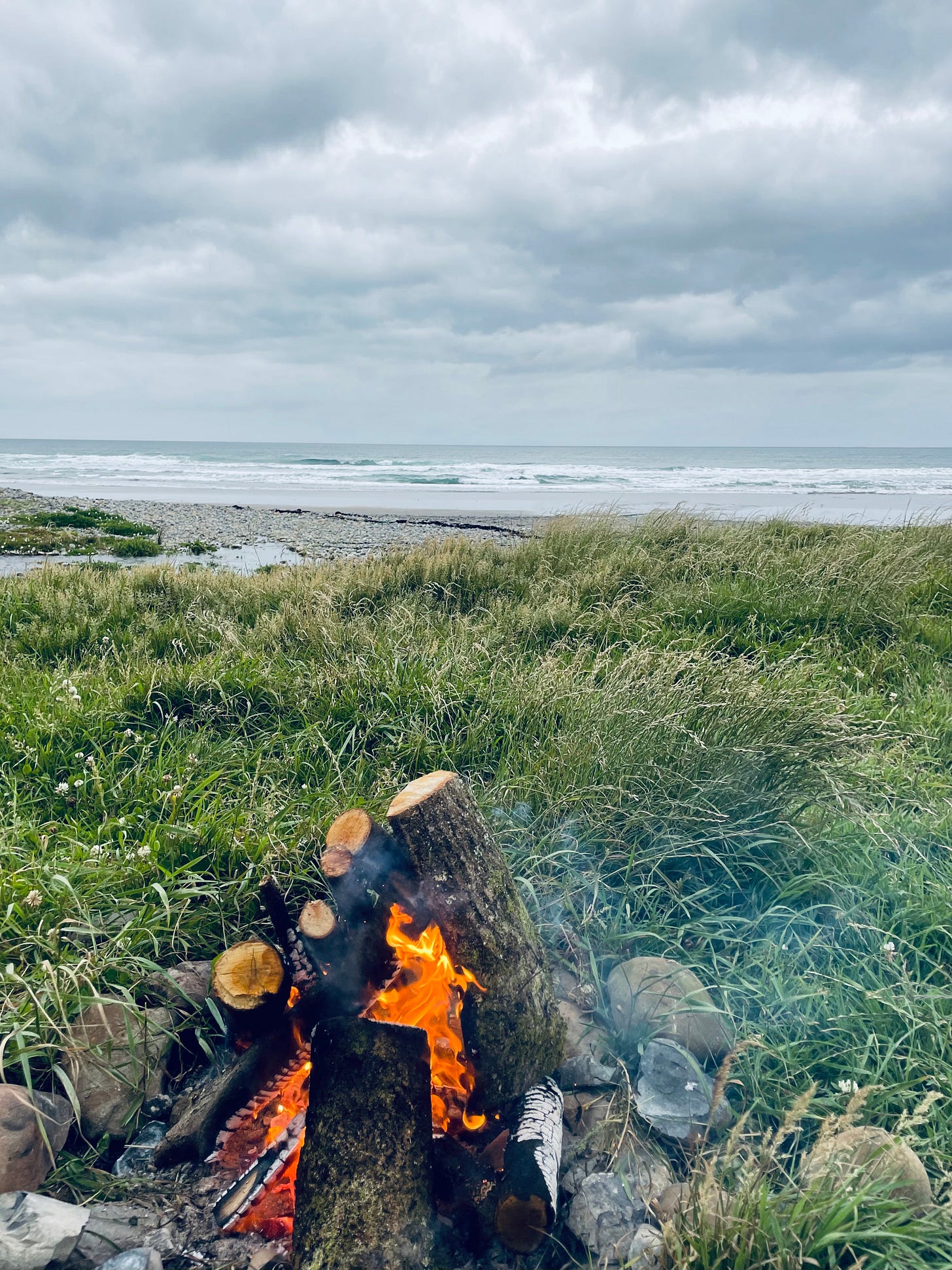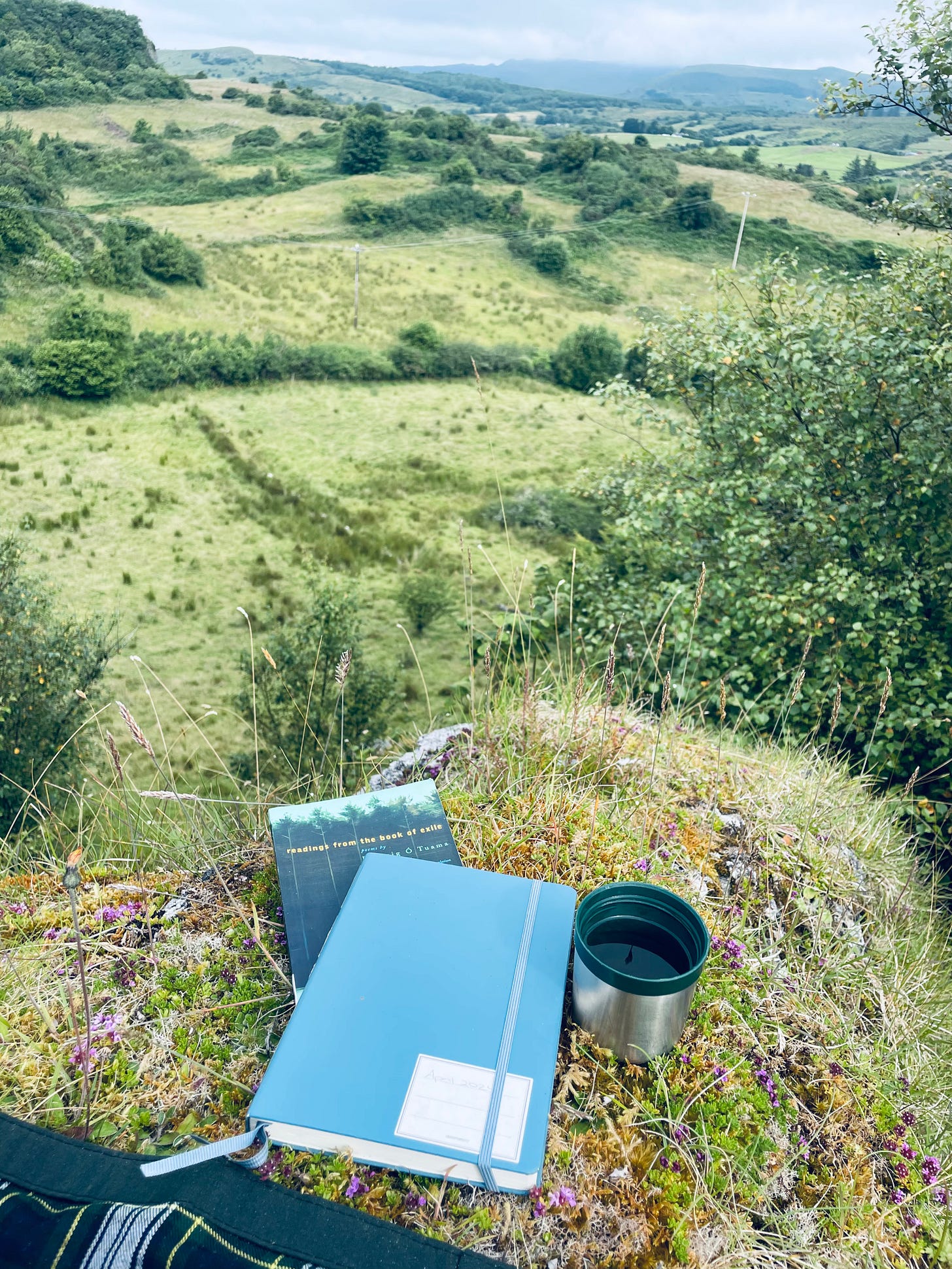How do you leave a place without running away?
This is the question I brought to one of my elders on the wild coastline of Donegal a few weeks ago. I had been working my way up to it for days, and, like all good questions, the asking was the beginning of a journey.
On the evening of the 11th July, I watched the smoke rise from a bonfire, black and serpentine against a blue sky. A neighbour was burning garden rubbish, but it brought to mind the hundreds of bonfires lit across the north of Ireland to kick off the Twelfth celebrations.
Bomb Scared
I never attended an 11th bonfire. We were part of the mass exodus who left the north for the Twelfth fortnight. Donegal was our place of exile, a small strip of wild land where friends of my parents had a caravan. I remember card games in the rain, cowrie shells, digging a speedboat into the sand and my parents slow dancing to Van Morrison on their wedding anniversary. We were there when news of a bomb in our hometown came to us through the wireless radio on the 5th July 1993.
This year, on the Twelfth, we drove to Donegal to the same wild spot I visited as a child, to the same family who owned the caravan. The synchronicity of the trip was lost on me until I caught sight of my neighbour’s bonfire when loading up the car.
We departed from Sligo this time, our home of almost a year. Not to escape anything, but because I am in search of elders to whom I can take my questions of identity, loss, violence and grief.
A Piece of Glass
How do you leave a place without running away?
Once, when I was a little girl, the fire brigade was called to a blaze in the point field. We ran down the road in our bare feet to watch jets of water singe the barley until it was sodden and bitter. When it was over, my mother got a piece of glass and showed us how the sun, that beautiful ball of summer heat, can cause destruction. I held my hand out while the hot point burned a path across my palm.
I am a beneficiary of colonialism. This is a sentence I have been sucking for months, possibly years. I am nursing it like a sore tooth, worrying its sharp edges, paying attention to the pain.
It is part of a wider conversation about privilege1, anthropocentrism and the undeniable feeling that the world as we know it is ending2. But my motivation for bringing my question to the beach that day was to admit the hostility I feel towards parts of my culture.
Why the bonfires?
Back in 1690, fires were lit to guide King William III following his victory at the Battle of the Boyne. This victory secured a Protestant line of succession for the British crown. Today, some of the bonfires are over 200ft tall. This year, a man did a parachute jump from the top of a pyre and every year there is some form of controversy, be it sectarian effigies burnt at the stake, the collapse of enflamed pallets, rubber tyre firelighters, scorched earth or an overwhelmed fire service.
For some within the local communities they are a tradition, a community gathering, and a celebration of their values. For me, they are a source of shame and embarrassment.
What makes it complicated, is how enmeshed our histories are. I remember sitting on my grandfather’s shoulders, waving a tatty, plastic Union Jack, his hands clasped firmly around my tiny ankles. The love I have for my grandmother is fierce. My parents, who sheltered us from bigotry and hatred, worked hard to build an alternative culture of christian values - we had a beautiful, peaceful childhood.
And yet, it is important to me that I reckon with what I come from. Not to blame, but to take responsibility, to acknowledge the ways it impacts how I see the world.
The Answer is in a Story
When I brought the question to my friend that day, he answered with a story. It involved his family tree and the work his daughter has done to map their family’s connections to the past.
Narrative theology #1
And I said to him
Are there answers to all of this?
And he said
The answer is in a story
and the story is being told.
And I said
But there is so much pain
And she answered, plainly,
Pain will happen.
Then I said
Will I ever find meaning?
And they said
You will find meaning
Where you give meaning.
The answer is in the story
And the story isn’t finished.
By Pádraig Ó Tuama
This poem is one of many from readings from the book of exile3 that are helping me find my feet in Sligo. I live only a few hours from the place of my birth, but the distance I feel is vast. This self-imposed exile allows me some perspective on bonfires, religion, the Twelfth mass-exodus, bombs, division, places of belonging and the subtle and not-so-subtle ways my homeland’s troubled past infuses day to day life.
Enough Water
I am reminded of a scene in Barbara Kingsolver’s Poisonwood Bible when Orleanna Price explains her response to untenable circumstances by saying, ‘I knew Rome was burning, but I had just enough water to scrub the floor, so I did what I could’.
The world is on fire. When there are people in the north of Ireland burning Palestinian flags on bonfires, the world is on fire. When melting ice flows into the Atlantic and weakens the ocean current responsible for regulating our weather systems, the world is on fire (and our summers are a damp squib). When algae blooms in the lake on our doorstep, the world is on fire. When I hop into my diesel car bound for Donegal, the world is on fire.
Can you feel it?
In the point field, a few weeks after firefighters put out the blaze, green grass punctured the blackened earth. This swidden, where ash enriched the soil, grew lime-bright grass. I ran my hand over its downy softness and felt the miracle of it.
The world is beautiful. When grass shoots green and gentle from scorched soil, the world is beautiful. When a poor4 girl defeats all the odds, and then writes about it, the world is beautiful. When poets and artists give voice to our pain and joy so we can know it better, the world is beautiful.
Can you see it?
Home
Ó Tuama gave me the word deoraiocht, the Irish word for exile, which carries the implication, ‘to be in a state of tears.’ This seems an appropriate starting point. From there, I wiggle my toes into the earth of the place in which we have settled, and I feel its welcome.
I am home when I dive into the Atlantic and taste its salt on my lips. I am home among the ripening haws, the bramble flower and the fields of ox eye daisy. Like the honeybees who have re-orientated to this landscape by committing natural markers to memory, so too will I: edge of lake where heron stalks, bough of ash on which hooded crow nests, avenue of hazel and standing circle of limestone. Home. For now.
How can I leave a place without running away?
By turning to face it, catching my breath and acknowledging the complexity of my history; with poetry and stories from the people a few steps ahead; slowly; with commitment to my metaphorical scrubbing brush - I will write my way whole; by letting things be - the story isn’t finished yet.
I have just finished Katriona O’Sullivan’s powerful memoir, Poor. It’s the kind of book that turns you inside out and changes the way you see the world - all for the better. Read it.
This book, Life After Doom, is putting words to things I have been guessing at and feeling for a very long time. I am reading it with friends, but finding it hard to talk about. It requires courage to keep reading but I’m all in, and so grateful for authors like these who shine light into very dark places.
https://www.padraigotuama.com/published-poetry
https://katrionaosullivan.org/







"I am a beneficiary of colonialism." - I'll be here for a while...
An elder once described Northern Ireland as the bastard child of England and Ireland- rejected by both. Yet, like many unwanted children she has a unique beauty. In order to grow into every possibility, we first have to own who and where we are. You bring your insights into your new family and help them to negotiate difference and diversity. There is no escaping, just embracing the good and letting go of what hurts. It all goes into making you. I love this piece.